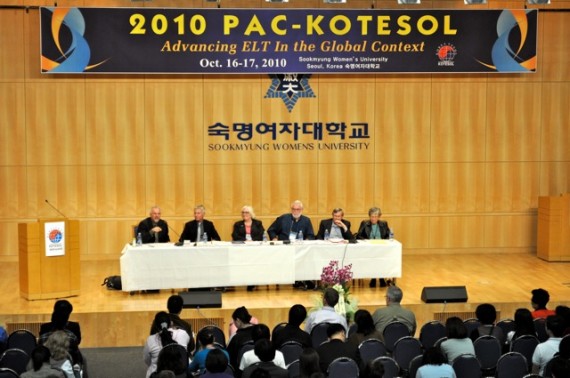This year KOTESOL (Korea Teachers of English to Speakers of Other Languages) celebrated its 18th International Conference in Seoul. Under the slogan of “Advancing ELT in the Global Context,” over 1,500 English teachers from around the world visited the conference.
Among those attending were also a stellar list of presenters. This year was the first time there was a plenary panel discussion about the state of ELT in the world today. One of the members of the plenary panel was Dr. David Nunan.
The following are some follow-up questions to the plenary panel discussion:
What is your experience with KOTESOL and teaching English in Korea?
Dr. Nunan: I’ve been coming to Korea for conferences, consultancies and teacher education for the last twenty years. I have been a presenter at many KOTESOL conferences.
What was the most important topic/theme (related to ELT) you heard people talking about at this year’s conference? Why?
Dr. Nunan: The hot topics right now are globalization and the emergence of English as the global language, the teaching of English to younger learners and the use of technology to enhance the teaching of English. all these issues are interrelated. English has emerged as the international language of business, entertainment, education, and media because of the dominance of the USA as the largest economy in the world. Organizations, governments and individuals know they can increase their value by learning English. Middle-class parents believe that they can give their children an advantage at school and ultimately in the workplace by having them learn English. Because of the belief that the earlier you begin learning a language the better you will be at that language, educational systems around the world are lowering the age at which English is introduced as a compulsory subject. The insatiable demand for English is far outstripping the supply of adequately trained teachers. Technology has stepped in to supplement face-to-face instruction.
English in Korea (and the world) is quickly becoming a form of social and economic exclusion. Many Korean’s believe that forcing everyone to learn English is another way to separate the “haves” from the “have nots”. Do you think that is true? Do you have any suggestions as to how this can be prevented?
Dr. Nunan: I believe that a situation of “haves” and ‘have nots” is an unfortunate reality. One 25% of the world’s population have the opportunity to learn and use English and these are people who are already advantaged. The only solution has to be a political one – governments have to improve the quality of English language education in public schools.
Some people say teaching English is not a “real” job. It is something you do to save money for a backpacking trip around the world or a way to hold off being a corporate slave back home. Furthermore, many English teachers (even the ones with masters degrees in TESOL or Applied Linguistics) eventually leave the field because there just isn’t enough money in it. Is teaching English a job with a sustainable future or more of a short-term career move?
Dr. Nunan: Until the public perception that all you need in order to teach English is to be a native speaker is reversed, this will not change. It is up to us as teachers to argue the case for English as a profession, to demonstrate that well-trained non-native speakers of English with good English skills and appropriate training as just as effective, if not more effective than Native English teachers.
Many Koreans would prefer to learn English from a native speaker with little or no experience teaching English than from a certified Korean English teacher. However, David Graddol in his book English Next says that there is a trend that native-speaker norms and native speakers themselves are becoming irrelevant. Will we [native speakers] be out of a job in the near future?
Dr. Nunan: Absolutely not. I would like to see the first language status of the teacher become an irrelevance, and that employment and advancement be based on criteria other than first language status. Associations such as TESOL have developed performance standards for teachers, and these should be the criteria for deciding who gets to be employed as a teacher.
Where do you see the ELT industry in the next 10 years?
Dr. Nunan: I was asked this question ten years ago, and will give the same answer now as I gave then. “Technology will become increasingly significant, the teaching of English to young learners will become more effective through the development of age appropriate curriculum models, materials, teacher training, and (this is a wish rather than a prediction), government agencies will look to bodies such as The International Research Foundation for Language Education (TIRF) for data-based advice upon which to base policy decisions.
Do you have any advice on for current teachers or people interested in getting into the field?
Dr. Nunan: Teaching is a vocation. You have to love what you do and care for your students. If you’re doing this job simply for the money, or because you can’t think of anything else to do, then get out now.
Dr. David Nunan is the Academic President of Anaheim University based in Anaheim, California. Dr. Nunan serves in a concurrent role as Dean of the Graduate School of Education and Professor of Teaching English to Speakers of Other Languages (TESOL). He is also a best-selling author. In 2003, Business Review Weekly ranked him the 7th most influential Australian in Asia, and in 2005, he was named one of the top “50 Australians Who Matter.” Dr. Nunan has this year authored “The Learner-Centred Curriculum: A Study in Second Language Teaching.”




Recent comments